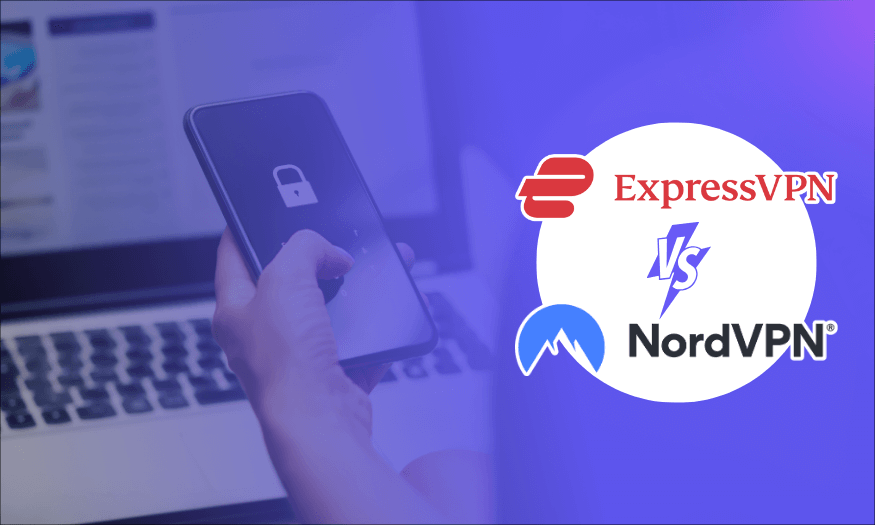
ExpressVPN vs NordVPN
- Table of Contents
- ExpressVPN vs NordVPN: Comparison at a Glance
- Which Is Better: ExpressVPN vs NordVPN?
- Security
- Privacy
- Key Features
- Speed
- Streaming Performance
- Plans and Pricing
- Servers and Locations
- Platforms, Interface and Ease of Use
- Customer Support
- Parent Company and History
- Conclusion: Why I Think NordVPN Wins Overall
- My Methodology: How I Compared ExpressVPN vs NordVPN
- Other VPN Alternatives to Consider
- FAQ: ExpressVPN and NordVPN
Quick Answer: ExpressVPN vs NordVPN
NordVPN takes the win, but it’s a hard-fought match. While ExpressVPN is streamlined, user-friendly and reliable, NordVPN is bursting with interesting features. Try ExpressVPN today with a 30-day money-back guarantee, or check out NordVPN with its own guarantee.
If you’ve narrowed your virtual private network (VPN) search down to NordVPN and ExpressVPN, you’ve already done the hard part. Both of these VPNs are so strong that you won’t have a bad experience with either one. The battle of ExpressVPN vs NordVPN is a subtle contest: They’re the two best VPNs, but only one can be the best for you.
ExpressVPN has a better mobile interface, a larger server network, more simultaneous connections and a password manager. NordVPN is faster, cheaper and comes with more security features that are on offer in its larger security suite options.
In general, I recommend ExpressVPN for beginners and NordVPN for people with more experience, but even those circles overlap.
In this article, I’ll help you resolve your dilemma by analyzing which VPN appeals to each type of user. If you haven’t made a choice by the end, let me know in the comments and I’ll help you get the rest of the way.
ExpressVPN vs NordVPN: Comparison at a Glance
Since both NordVPN and ExpressVPN provide the same service — a virtual private network, as defined in my article What Is A VPN — it made the most sense to directly compare them on all the traits of a good VPN.
A VPN’s top job is to keep you safe and protect your privacy, which both do with aplomb. However, there are differences in the details. If you’ve read my ExpressVPN review, you’ll know it focuses more on perfecting the basics, while my NordVPN review reveals that service to be more daring and innovative.
In addition to security, privacy and features, I’ll cover each VPN’s speed, streaming performance, pricing, server network and customer support. I’ll also do some investigative digging to uncover whether there’s any reason to be suspicious of either VPN (spoilers: no).
| Comparison: | ExpressVPN: Wins (6) | NordVPN: Wins (5) |
|---|---|---|
| Security | ✔️ OpenVPN ✔️ IKEv2 ✔️ Lightway ✔️ AES-256 ✔️ ChaCha20 ✔️ No leaks | ✔️ OpenVPN ✔️ IKEv2 ✔️ NordLynx ✔️ AES-256 ✔️ ChaCha20 ✔️ No leaks ❌ 2018 security scare |
| Privacy | ✔️ Audited no-logs policy ✔️ RAM-only servers ✔️ Gave no evidence when raided by law enforcement | ✔️ Audited no-logs policy ✔️ RAM-only servers ✔️ Never been raided ❌ Deleted warrant log page |
| Features | ✔️ 8 device connections ✔️ Kill switch ✔️ Split tunneling ✔️ Ad & malware blocker ✔️ All servers with specialty functions | ✔️ 6 device connections ✔️ Kill switch ✔️ Split tunneling ✔️ Ad & malware blocker ✔️ Meshnet ✔️ Dark web monitor ✔️ Specialty servers |
| Speed | ⬆️ Average download speed: 77% unprotected | ⬆️ Average download speed: 90% unprotected |
| Streaming | ✔️ Netflix ✔️ Hulu ✔️ Amazon Prime Video ✔️ Max ✔️ Disney+ ✔️ BBC iPlayer | ✔️ Netflix ✔️ Hulu ✔️ Amazon Prime Video ✔️ Max ✔️ Disney+ ✔️ BBC iPlayer |
| Pricing | 💲 Best price: $6.67/month for 15 months | 💲 Best price: $2.99/month for 27 months |
| Servers | 🌎 166 locations in 105 countries | 🌎 83 locations in 60 countries |
| Platforms | ✔️ Windows ✔️ MacOS ✔️ Linux ✔️ Android ✔️ iOS ✔️ Browsers ✔️ Smart TVs ✔️ Routers | ✔️ Windows ✔️ MacOS ✔️ Linux ✔️ Android ✔️ iOS ✔️ Browsers ✔️ Smart TVs ✔️ Routers |
| Support | ✔️ Knowledgebase ✔️ 24/7 live chat (human) | ✔️ Knowledgebase ✔️ 24/7 live chat (starts with bot) |
| Parent Company | 🏢 Kape Technologies | 🏢 Nord Security |
Which Is Better: ExpressVPN vs NordVPN?
When dealing with ExpressVPN and NordVPN, it doesn’t make much sense to use the word “better.” They’re both excellent for different reasons. It’s like arguing about whether LeBron James or Steph Curry is the best player in the NBA — the only reasonable answer is that it depends on the game.
I tend to think ExpressVPN is slightly stronger because it’s the best choice for first-timers. VPN providers are better when users can get things done quickly, and no service has you browsing the internet or getting Netflix unblocked faster than ExpressVPN. Below, I’ve listed the best use cases for each of our contenders.
I Recommend ExpressVPN For…
- New VPN users: I literally don’t know how ExpressVPN could be easier to use.
- Streaming: ExpressVPN has a larger server network, giving you more options for streaming IP addresses and stable servers.
- Families and households: ExpressVPN recently upgraded its long-term plans to include eight simultaneous connections, and an Aircove router can get even more devices on one subscription.
I Recommend NordVPN For…
- Slower connections: NordVPN maintains faster download speeds on average, so it’s best for those with sluggish internet.
- Saving money: NordVPN is cheaper than ExpressVPN if you subscribe for a longer term, even if you spring for extra features.
- Tor users: Onion over VPN works on both services, but NordVPN has specialty servers designed to work with Tor Browser.
Security
A VPN needs to be able to maintain its encrypted tunnel no matter what happens. When checking security, I make sure the VPN uses safe encryption methods only, avoids IPv6 and DNS leaks, and has never been hacked — or if it has, I confirm that it dealt with the vulnerability as quickly as possible.
| Security: | ExpressVPN | NordVPN |
|---|---|---|
| VPN Protocols | Lightway OpenVPN IKEv2 | NordLynx OpenVPN IKEv2 |
| Encryption Types | AES-256 ChaCha20 | AES-256 ChaCha20 |
| Kill Switch | ✔️ | ✔️ |
| Private DNS | ✔️ | ✔️ |
VPN Protocols
Both ExpressVPN and NordVPN use the protocols that we currently consider to be the most secure. OpenVPN and IKEv2 are available on both VPNs, and each uses AES-256 encryption, which has never been broken (and mathematically can’t be, at least until quantum computing takes a massive leap forward).
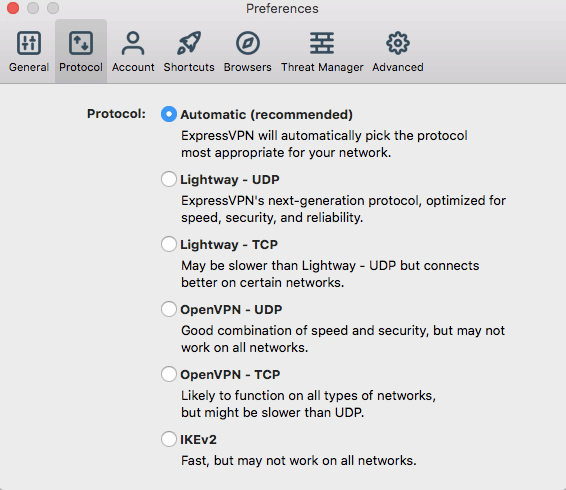
Specialty Protocols
Each service also has a unique protocol you’ll find on only that VPN. NordVPN has NordLynx, which is built on the newer WireGuard protocol and the ChaCha20 stream cipher. Like AES-256, ChaCha20 has never been hacked, but it also transmits data faster. My tests bore that out, giving me better speeds whenever I used NordLynx.
ExpressVPN has Lightway. Unlike NordLynx, Lightway was built from the ground up. It’s based on wolfSSL, a cryptographic library that defaults to ChaCha20. That may be why it feels similar to NordLynx or WireGuard: It’s fast, stable and most importantly secure.
How can I be so sure that these protocols are secure? The ciphers themselves may be uncrackable, but even the best encryption can fail due to poor VPN infrastructure — especially when we’re up against foes like the NSA PRISM program. To be certain, I tested both ExpressVPN and NordVPN for DNS leaks and encryption failures.
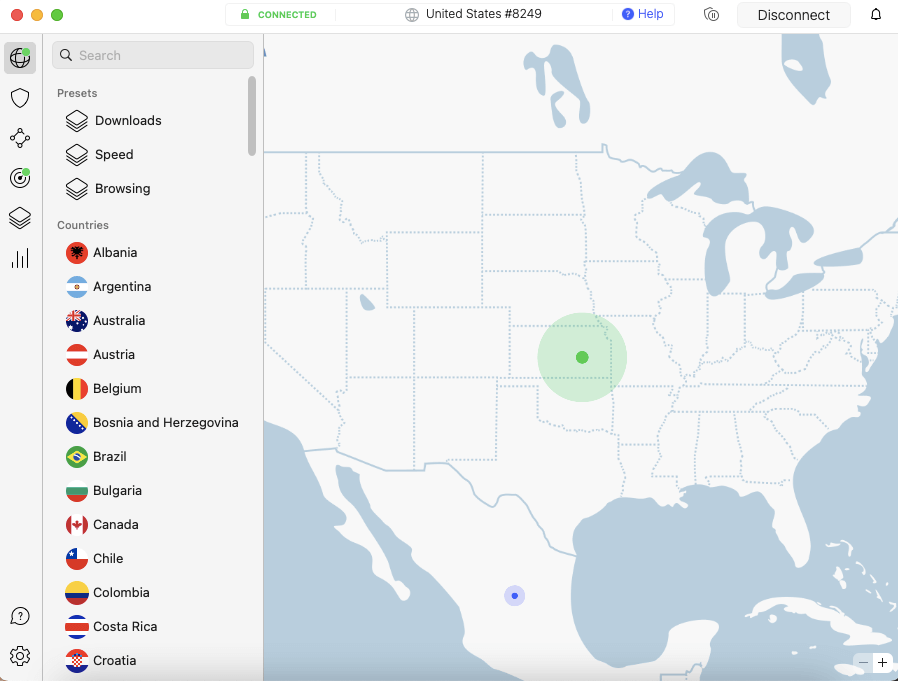
sent over my network should go through an encrypted tunnel.
DNS Leak Test
For the DNS leak tests, I found my real IP address, then checked it again on various VPN servers. I never saw the real address once either VPN was active, proving they both do their basic job.
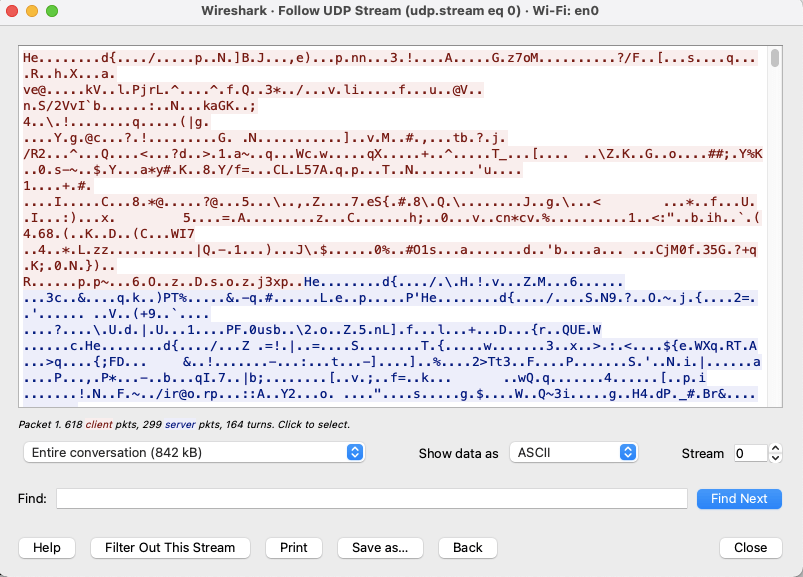
Successful encryption looks like this (from ExpressVPN).
I also ran a Wireshark packet analysis to see whether the VPNs encrypted data sent through my network. Both VPN providers passed, showing me results like in the screenshot above.
Security Breaches
I also looked at how well each VPN handled security breaches throughout its history. ExpressVPN has never been hacked. Although it’s difficult to judge how it would respond to an incident, I can’t deny that having over 10 years without an occurrence is a very strong record.
NordVPN did suffer a hack in 2018, but it wasn’t as serious as some made it out to be. Yes, hackers broke through security at a data center in Finland, but they couldn’t have seen any user activity with the level of access they achieved. The only part that truly concerns me is that NordVPN took several months to report the breach.
Obfuscation & Site Blocking
If you’re looking for a VPN you can use in China, both services come with obfuscation. ExpressVPN masks connections on every server, while NordVPN does so on specific obfuscated servers.
Finally, for those interested in parental controls, ExpressVPN comes with a built-in adult site blocker, while NordVPN asks users to rely on other apps.
Privacy
According to ExpressVPN’s privacy policy, it collects neither activity logs nor connection logs, leaving nothing to link your browsing activities to your IP address. NordVPN’s privacy policy makes a similar statement, saying “we do not store used bandwidth, traffic logs, IP addresses or browsing data.”
| Privacy Feature: | ExpressVPN | NordVPN |
|---|---|---|
| No-Logs Policy | ✔️ | ✔️ |
| Privacy Audit | ✔️ | ✔️ |
| RAM-Only Servers | ✔️ | ✔️ |
| Base of Operations | 🇻🇬 British Virgin Islands | 🇵🇦 Panama |
| User Details for Signup | ➡️ Email address ➡️ Payment method | ➡️ Email address ➡️ Payment method |
So, both ExpressVPN and NordVPN claim to have “strict no-logs policy,” but what evidence do you have that they’re telling the truth? To start, you can rely on third-party audits. ExpressVPN had its privacy policy confirmed by KPMG, while NordVPN got a clean report card from Deloitte.
RAM Servers
You can also look into the VPN’s own server infrastructure. Privacy-focused VPNs make a point of storing all server activity logs on RAM instead of hard drives, where they get deleted with every hourly reset. ExpressVPN does this through TrustedServer. NordVPN switched to RAM-only servers after the 2018 incident and now has no hard drive storage on any server.
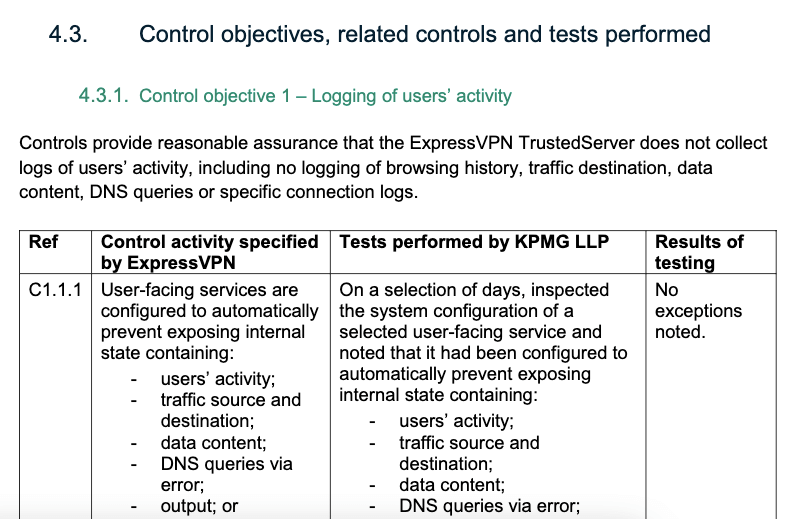
it eventually assures users that their browser histories are safe.
As further evidence, both NordVPN and ExpressVPN make their money through subscriptions, so they don’t need to risk alienating their customers by selling activity logs.
Reactions to Legal Action
However, I always find the best way to verify a VPN’s privacy is to look at the real world. Has the VPN ever given up user data in response to a law enforcement demand?
ExpressVPN faced a moment of reckoning in 2017 when Turkish police raided one of its servers in the country. The police found no evidence whatsoever, proving ExpressVPN’s privacy claims better than any audit could.
The picture is murkier with NordVPN. For a while, it claimed it would never comply with any legal action. The company changed its tune in 2022, admitting that it couldn’t actually ignore subpoenas without breaking the law. It reassured users by publishing a regular “warrant canary” report, showing that it hadn’t been served with any data demands.
However, a Reddit post from late 2023 confirmed that the warrant canary page had disappeared. As NordVPN lacks better evidence to support its response to legal action, I’m giving ExpressVPN a slight privacy edge.
Key Features
If you’re looking for lots of features, go with NordVPN. ExpressVPN has always focused on doing a few things very well, and consequently, it hasn’t come up with many groundbreaking widgets. NordVPN is the innovator of the pair. Let’s run down the features you get from each service.
ExpressVPN Features
ExpressVPN’s main feature is its server network, which offers IP addresses in 105 countries. You can choose a country from its searchable menu and add favorites to find again later. It has over 3,000 servers total, which helps its speed and latency (see the next section) by reducing overcrowding.
Although ExpressVPN calls this a “vast server network” (and it’s more than NordVPN offers), there are other VPNs with wider networks, like HideMyAss VPN, which has servers in 210 countries.
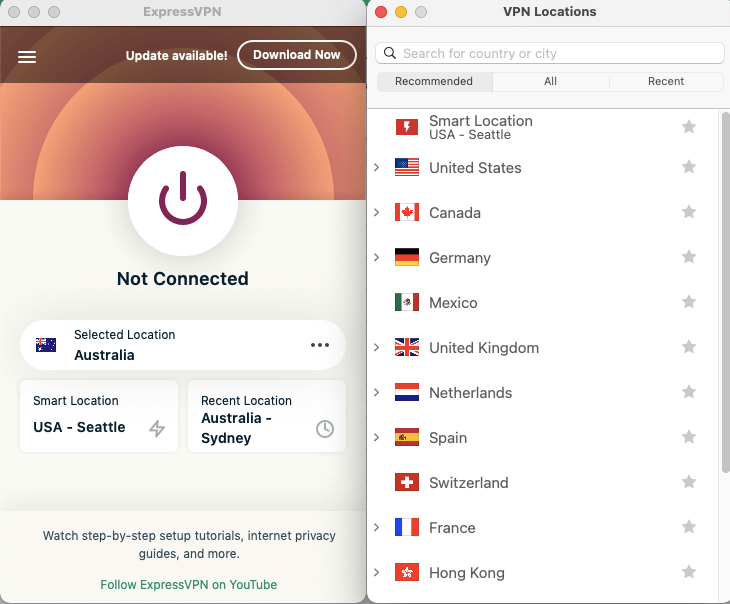
Beyond the basics, ExpressVPN comes with “network lock,” a kill switch that protects you during sensitive activities like torrenting. If your VPN connection drops, the kill switch cuts off your internet connection, preventing your internet service provider (ISP) from catching you on BitTorrent. “Network lock” cuts off all network access system-wide, not just on your web browser.
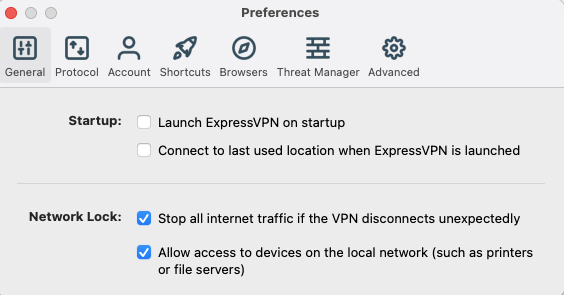
You also get split tunneling on all apps except those for macOS 11 and above. ExpressVPN has app-level split tunneling, meaning some apps connect through the VPN while others work unprotected.
Split tunneling is another good feature for torrenting — your client can run protected in the background, even if you don’t want protection on your browser. However, the lack of URL-based splitting is disappointing, as is the macOS exception.
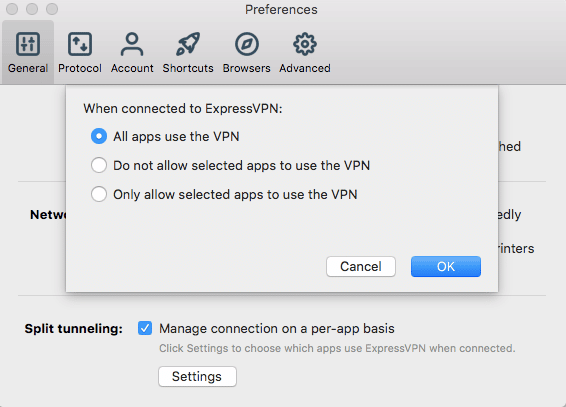
ExpressVPN also has a blocking feature called “threat manager” This feature maintains a list of sites associated with malware and trackers, and blocks them while active. As of October 2023, “threat manager” can also block display ads, though not video ads. The ‘threat manager” feature works only on the Lightway protocol, but you’ll be using that most of the time anyway.
Finally, ExpressVPN also comes with its password manager, which you can dive into further detail in our ExpressVPN Keys review.
NordVPN Features
Next, let’s turn our attention to NordVPN. It’s got all the same major features as ExpressVPN, including a network of selectable servers, a kill switch, split tunneling and a malware and ad blocker. You can browse its server list using a search bar or a scrolling map.
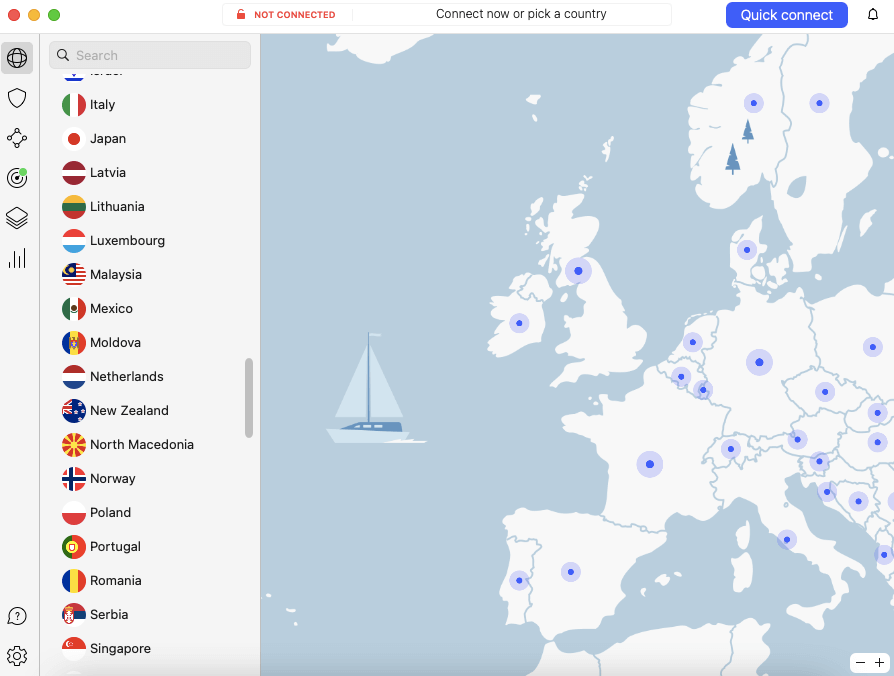
As with ExpressVPN, NordVPN’s kill switch is strictly app-level. Its split tunneling is more restrictive, available only on Windows, Android and Android TV.
NordVPN’s ad blocker, called “threat protection,” beat ExpressVPN in my tests by managing to block video ads. However, it’s not as widely available, with only Windows and macOS users getting the full service.
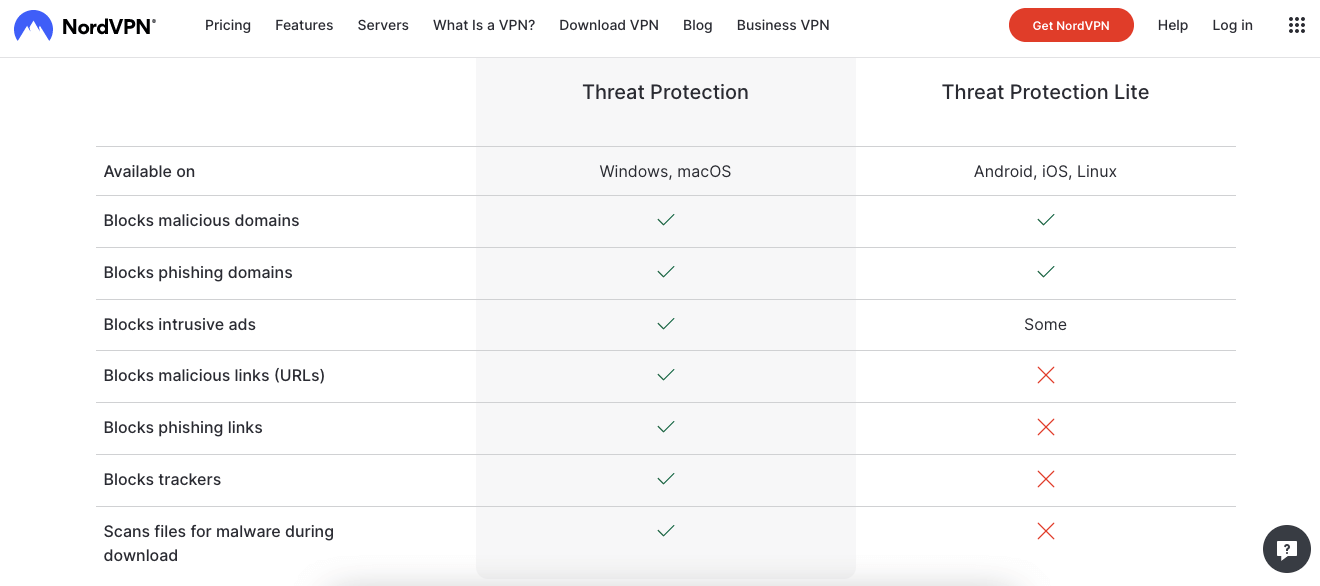
can’t scan files or links and doesn’t block as many ads.
Specialized Servers
NordVPN’s network includes many types of specialized servers and several features that ExpressVPN lacks. First, there are static IP addresses. If you find yourself repeatedly blocked or forced to fill out CAPTCHAs when trying to use the internet with NordVPN, switching to a static IP might help. Note that these are shared servers, different from a dedicated IP address that you get all to yourself.
Next, the double VPN connections route you through two VPN servers instead of one for an extra layer of redundancy. It’s slower but offers peace of mind for especially sensitive activities. Obfuscated servers get you around network-level VPN blocks, like those you might find in schools or offices (note that the ExpressVPN app does this automatically on every server).
Onion over VPN servers are designed to help you use the Tor network to access the dark web while remaining protected from malicious nodes. As I cover in my article Is Tor Safe?, combining onion routing with VPN protection is the most private browsing experience possible. Finally, there are P2P servers that aim to provide faster torrenting speeds.
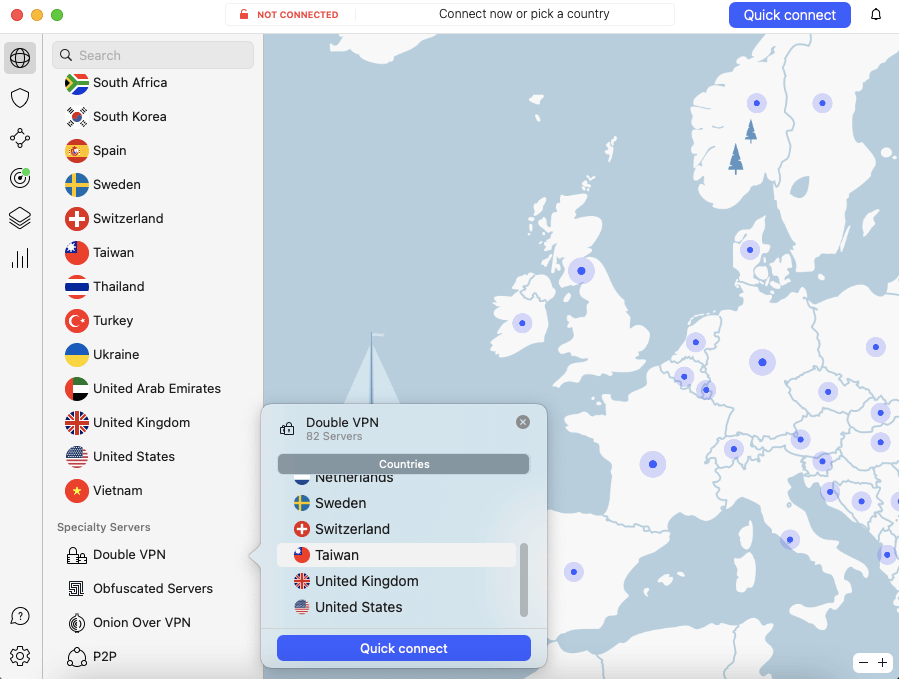
VPN connections, obfuscation and Onion over VPN are well worth it.
Dark Web Monitor
NordVPN comes with a dark web monitor that scans sites where hackers typically dump stolen account credentials. If it finds out your email address has been compromised, it’ll send you an alert. ExpressVPN has no comparable feature; it recommends third parties instead.
Meshnet
The last NordVPN innovation I’d like to mention is Meshnet. This feature uses NordVPN to encrypt any remote connection between two devices. For example, if you use Microsoft Remote Desktop to access your work computer while traveling, you can make that connection secure even though it doesn’t run through a NordVPN server.
Meshnet is a step forward for security, since a lot of hacks start with unsecured remote access. In fact, NordVPN got hacked in 2018 through a remote data center control panel — if I wanted to speculate, I’d say that incident might have inspired Meshnet.
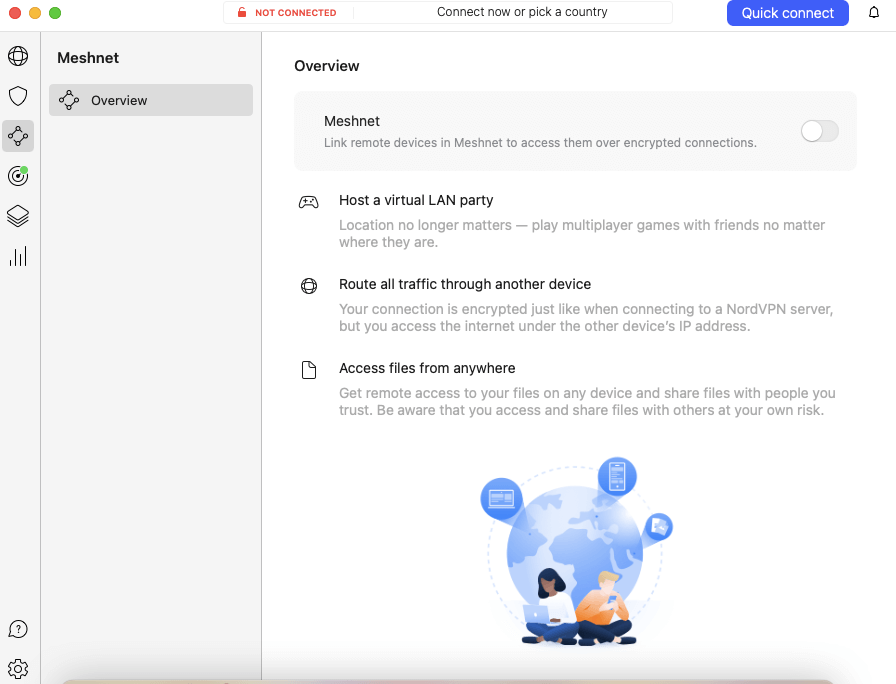
Even better, Meshnet lets you use a connected device as a VPN server, opening IP addresses in places where NordVPN doesn’t have official servers. Meshnet is free for everybody, even people without a NordVPN account. You can read the full Meshnet guide for more details on this tool.
NordVPN vs ExpressVPN Features Recap
Whether a VPN should have a few impeccable features or lots of decent features is down to personal taste, though I can’t deny that NordVPN simply gives you more power than ExpressVPN. However, I’ll add that neither gives you the same fine-grained control as CyberGhost, which you can read about in my CyberGhost review.
Speed
As I see it, speed is a safety feature. Without fast download speeds (for browsing and streaming), fast upload speeds (for posting and torrenting) and low latency (for gaming and chatting), we tend to “forget” to turn on our VPNs before getting online.
ExpressVPN and NordVPN are both speed demons. I rarely experience slowdowns when using either one. Thanks to my ISP’s habit of occasionally throttling internet traffic connections, I often connect to one of these VPNs when I want my internet to go faster. But since I still want to name a winner, I tested each VPN in the same six international locations to see which was fastest.
As I expected, both performed impressively. However, in both the close-in tests and the worldwide average results, NordVPN came out ahead.
ExpressVPN Speed Tests
| Location: | Download (Mbps) | Upload (Mbps) | Latency (ms) |
|---|---|---|---|
| 🇺🇸 USA (unprotected) | 60.03 | 5.94 | 22 |
| 🇺🇸 USA (fastest server) | 54.71 | 5.60 | 27 |
| 🇬🇧 U.K. | 53.93 | 5.55 | 292 |
| 🇧🇷 Brazil | 46.18 | 5.46 | 554 |
| 🇿🇦 South Africa | 16.63 | 3.45 | 639 |
| 🇸🇬 Singapore | 53.78 | 5.51 | 410 |
| 🇦🇺 Australia | 52.65 | 5.35 | 343 |
| Average: | 46.31 | 5.15 | 378 |
These are strong numbers, reflecting ExpressVPN’s overall reliability as a service. Almost every location, no matter how far, kept at least 75% of my starting download speed. The only blip was the South Africa server, which returned results that were both disappointing and wildly uneven.
NordVPN Speed Tests
| Location: | Download (Mbps) | Upload (Mbps) | Latency (ms) |
|---|---|---|---|
| 🇺🇸 USA (unprotected) | 59.42 | 5.95 | 17 |
| 🇺🇸 USA (fastest server) | 56.77 | 5.62 | 25 |
| 🇬🇧 U.K. | 52.28 | 5.61 | 292 |
| 🇧🇷 Brazil | 54.97 | 5.37 | 398 |
| 🇿🇦 South Africa | 47.37 | 5.62 | 623 |
| 🇸🇬 Singapore | 58.60 | 5.63 | 360 |
| 🇦🇺 Australia | 52.35 | 5.29 | 435 |
| Average: | 53.72 | 5.52 | 356 |
Most of these tests were fairly consistent. The Brazil location gave me trouble, with download speeds swinging by as much as 15 Mbps until I switched to another server and stabilized it. However, it still came out much better than ExpressVPN’s South Africa location.
Both VPNs were extremely strong on the fastest server, making them ideal for general browsing activities. Their nearby latencies are low enough to make each a secure VPN for gaming, and consistent upload speeds mean either could be your go-to VPN for torrenting.
If you want to make your choice based on sheer vpn connection speed, though, NordVPN is the better service.
Streaming Performance
As long as your unprotected connection is fast enough to stream in HD or 4K, both NordVPN and ExpressVPN can handle those video qualities. Our next question is whether each VPN can unblock any streaming service without getting hit by a proxy error code.
I’ve found that the spread of six services in the table below does a good job of representing a VPN’s ability to circumvent blocks. If it can get into these, it can probably get into all of them. Let’s see how our two contestants fared.
| Service: | ExpressVPN Unblocks? | NordVPN Unblocks? |
|---|---|---|
| Netflix | ✔️ | ✔️ |
| Hulu | ✔️ | ✔️ |
| Amazon Prime Video | ✔️ | ✔️ |
| Max | ✔️ | ✔️ |
| Disney+ | ✔️ | ✔️ |
| BBC iPlayer | ✔️ | ✔️ |
No surprises here — both these VPNs have always been among the best choices for streaming. If you need the best Netflix VPN, either one will serve. For smart TV users, both VPNs have a smart DNS service that changes your IP address for streaming but doesn’t encrypt your data.
Plans and Pricing
NordVPN is more often the better bargain, but ExpressVPN is actually cheaper in a few scenarios, despite having a reputation for being costly. If you just want one month of service at a time, ExpressVPN is a few cents cheaper. It also allows eight simultaneous connections on one account, compared to NordVPN’s total of six, so ExpressVPN may be better for large groups.
However, if you’re prepared to sign up for a year or more, NordVPN becomes a much better deal. After the one-year mark, it’s only costlier than ExpressVPN if you opt for the Ultimate plan — and that only adds cloud storage, which you’re better off getting elsewhere. I’ll explain all the pricing options for each VPN in this section.
ExpressVPN Pricing
| Plan: | Price |
|---|---|
| One Month | $12.95 per month |
| Six Months | $9.99 per month ($59.95 total) |
| One Year + 3 Months | $6.67 per month ($99.95 total) |
After the first 15 months, billing moves to a 12-month cycle. This increases the monthly price to $8.32, still costing a total of $99.95. All of these plans come with eight simultaneous connections. You can try any ExpressVPN plan with the 30-day money-back guarantee, even the monthly plan.
NordVPN Pricing
NordVPN’s pricing is a bit more complicated, offering three sets of features, sold at three durations each.
| Plan: | Standard | Plus | Ultimate |
|---|---|---|---|
| Features: | VPN | VPN Password Manager Data Breach Scanner | VPN Password Manager Data Breach Scanner NordLocker Identity Theft Protection |
| One Month | $12.99 per month | $13.99 per month | $15.99 per month |
| One Year + 3 Months | $4.49 per month ($67.35 total) | $5.49 per month ($82.35 total) | $7.49 per month ($112.35 total) |
| Two Years + 3 Months | $2.99 per month ($80.73 total) | $3.99 per month ($107.73 total) | $5.99 per month ($161.73 total) |
Same as ExpressVPN, after the initial deal price expires after a month, year or two years, the pricing jumps up quite a bit if you want to keep using NordVPN: $99.48 per year for Standard, $126.96 per year for Plus, and $238.32 per year for Ultimate.
Servers and Locations
This is another category where the winner is subjective. ExpressVPN has more server locations, but NordVPN has a higher server count overall. That means you’re far more likely to find the IP address you need on ExpressVPN, but overcrowding and slowdowns should be less likely on NordVPN.
I say “should be” because, as I said in the “speed” section, there’s hardly a difference in practice. NordVPN may be slightly faster on average because it has more servers, but ExpressVPN’s larger range of options more than makes up for that. As such, I’m calling the VPN server networks fight for ExpressVPN.
ExpressVPN Server Spread
Let’s talk numbers. ExpressVPN has about 3,000 total servers, spread across 166 locations in 105 countries — including many of the biggest Netflix libraries and top gaming cities worldwide. Here’s how they’re distributed across the world.
| Region: | Countries | Locations |
|---|---|---|
| North America | 15 | 41 |
| South America | 9 | 10 |
| Europe | 47 | 65 |
| Asia | 25 | 33 |
| Africa | 6 | 6 |
| Oceania | 2 | 8 |
| Middle East | 2 | 2 |
| Totals: | 106 countries | 165 locations |
As you can see, ExpressVPN doesn’t just have lots of server locations — it reaches many areas that don’t typically enjoy VPN service. Six locations in Africa offer better speeds in more locations to Africans who might otherwise have to connect to a server in Europe or Asia, which would be much slower. The 10 different locations in South America are likewise water in a VPN desert.
NordVPN Server Spread
Now let’s see how NordVPN does. We already know it’s got more servers (about 5,000) but in fewer places — a total of 83 locations in 60 countries.
| Region: | Countries | Locations |
|---|---|---|
| North America | 4 | 20 |
| South America | 4 | 4 |
| Europe | 37 | 40 |
| Asia | 9 | 9 |
| Africa | 1 | 1 |
| Oceania | 2 | 6 |
| Middle East | 3 | 3 |
| Totals: | 60 Countries | 83 Locations |
Each of those locations may run faster because there are more VPN servers overall. However, that may not be enough to overcome the slowdowns faced by people in West Africa or Central Asia who live over 5,000 miles from a NordVPN location. ExpressVPN doesn’t just reach more of those people; it offers the world access to 45 more streaming libraries overall.
One thing to note, though, is that NordVPN does not offer any virtual servers, whereas ExpressVPN does.
Platforms, Interface and Ease of Use
Both VPNs are available on almost every device and OS you might use to get online. ExpressVPN has desktop apps for Windows, macOS and Linux, mobile apps for iOS and Android, browser extensions for Firefox, Chrome, Edge, Brave and Vivaldi, and native smart TV apps for Fire Stick, Apple TV and Android TV.
ExpressVPN also supports router installations, which protect all devices that connect through that router’s network. Router VPNs can also protect devices like game consoles that don’t support native VPN apps. Thanks to Aircove — a router that comes with ExpressVPN preinstalled — it may be the market’s easiest router VPN.
NordVPN has an almost equally robust range of apps on offer. There are Windows, macOS and Linux desktop apps, Android and iOS mobile apps, Chrome, Firefox and Edge browser extensions, and smart TV apps for Android TV and Fire Stick.
Though NordVPN covers fewer browsers and smart TVs than ExpressVPN, it also hits some platforms that its rival misses, including Raspberry Pi, Chromebook and Chromecast. You can also install it on VPN-compatible routers, letting it protect all smart TVs and game consoles. But regardless of which platform you’re on, let’s look at how it actually feels to use these two VPNs.
Ease of Use
ExpressVPN is aimed squarely at new VPN users and people who want to stay safe while browsing casually. When you just want to mess around with settings or unblock Hulu without picking a specialty server, ExpressVPN shines. Its control panels are uncluttered, connections are near-instantaneous and it never takes more than two clicks to do anything.
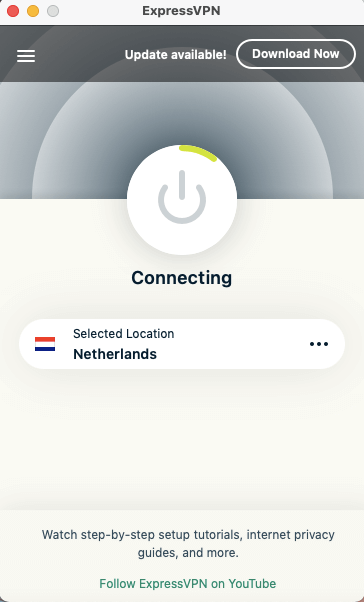
I don’t want to make it sound like NordVPN is hard to use, because it’s not. Compared to almost any other VPN, it runs without a whisper of complaint. But it’s up against ExpressVPN, so I can’t help but notice the occasional creaks. NordVPN’s controls are harder to find, its servers a touch more difficult to navigate and its connections a mite slower.
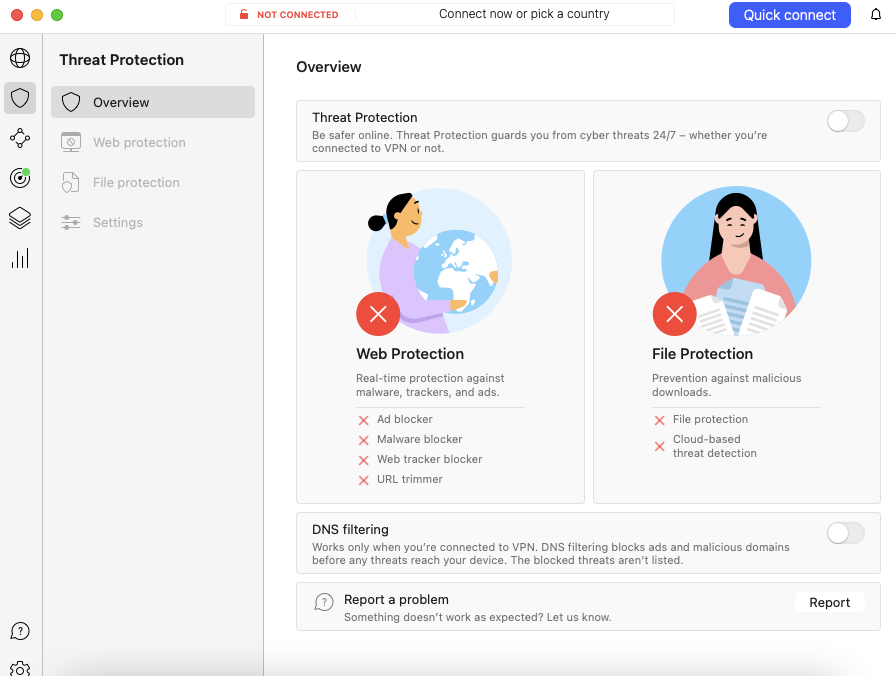
NordVPN also has a more complex control panel for its advanced features — necessary, since it’s got more features than ExpressVPN, but it still makes things harder to navigate. If you’re picking your very first VPN, I’ll recommend ExpressVPN more often.
Customer Support
Customer support is a high point for both VPNs, to the point where this category is almost a draw — but better live chat pushes ExpressVPN over the top. Both NordVPN and ExpressVPN have excellently written help centers, responsive live chat agents and same-day email support.
| Support Feature: | ExpressVPN | NordVPN |
|---|---|---|
| Knowledgebase | ✔️ | ✔️ |
| Live Chat | 24/7 (all human) | 24/7 (starts with bot) |
| Email Tickets | ✔️ | ✔️ |
| Phone Support | ❌ | ❌ |
| Forum | ❌ | ❌ |
You can open each knowledgebase directly from the respective VPN app. Both are easy to navigate, though I slightly prefer reading ExpressVPN’s, as it has fewer layers to dig through. Both services also wisely place their live chat icons at the bottom-right corner of every help center window.
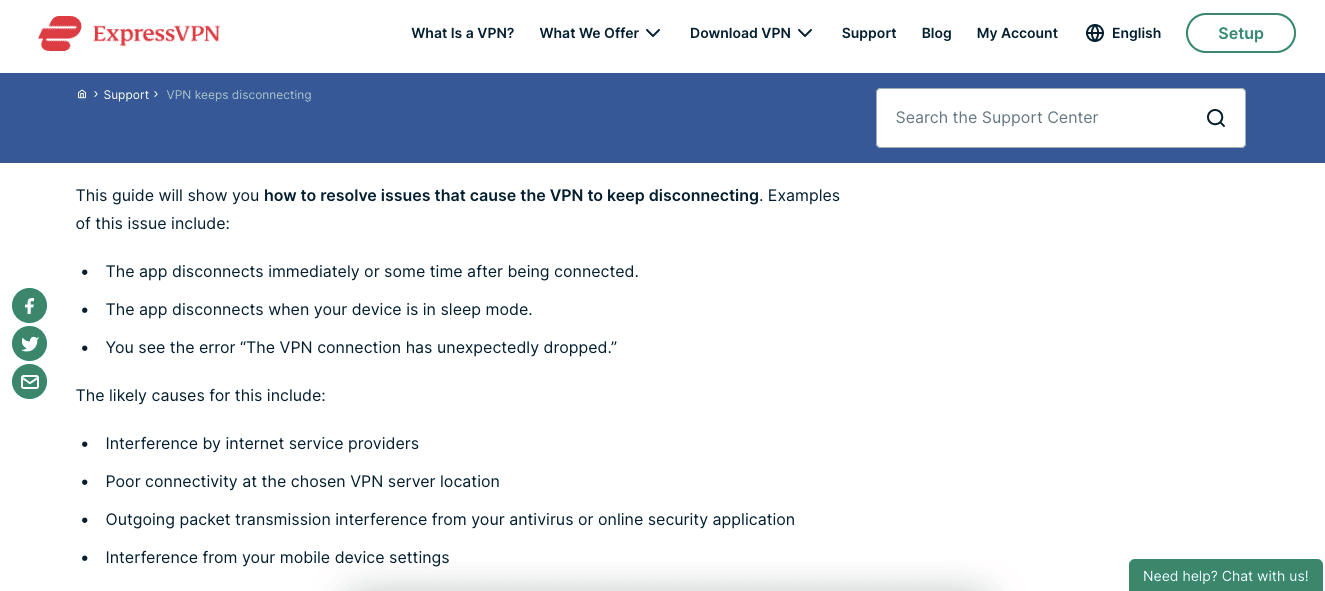
though I’m not sure why you’d want to share them on Twitter/X.
ExpressVPN doesn’t use a chatbot, which is heartening in the age of AI. Whether you have an account or not, you immediately start talking to a human. NordVPN starts you with a bot. That’s not always a bad thing, as its bot is generally very good at surfacing the right articles — but when it doesn’t work, it’s aggravating.
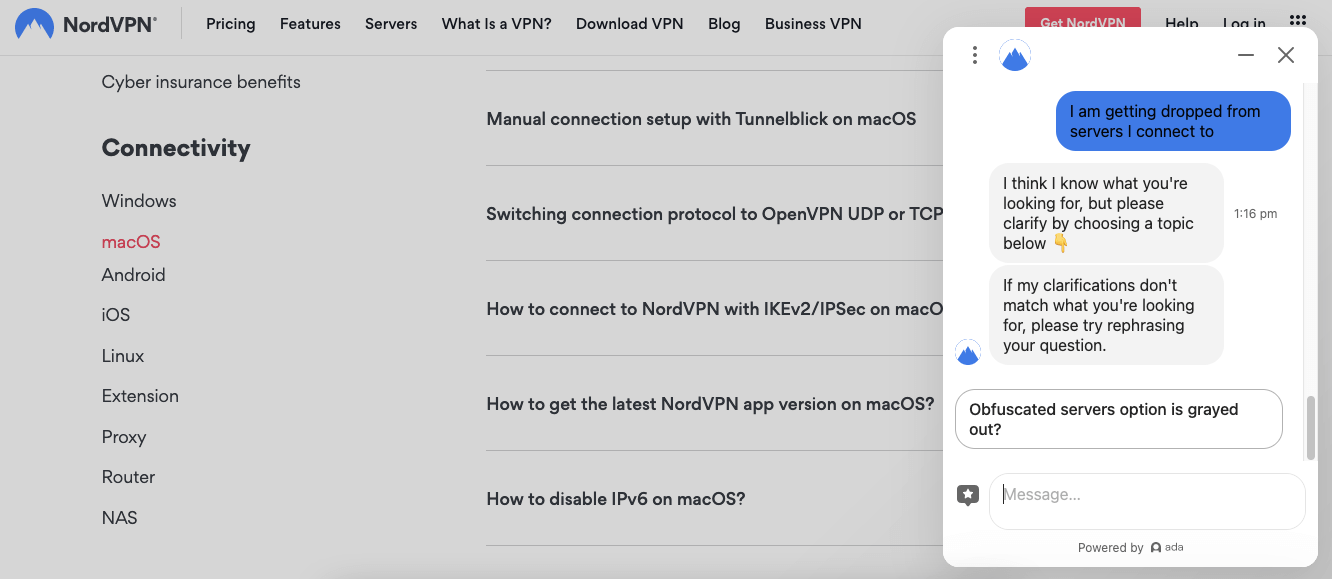
and refused to continue talking until I ran a speed test.
I had a simple question: “Why was my server connection dropped?” But the bot made me rephrase it several times, never coming near the right answer. It’s not too difficult to get past this obstacle course to a human, but since ExpressVPN starts you there, it wins this category.
Parent Company and History
As great as ExpressVPN is, there’s a big reason some people don’t choose it, and its name is Kape Technologies. Although it sounds like it should be outfitting superheroes, Kape is actually a holding firm for VPN services. As you can read in my Who Owns Your VPN investigation, Kape isn’t just the parent company for ExpressVPN, but also Private Internet Access, CyberGhost and ZenMate.
In the past, Kape (under the name Crossrider) produced ad-injection technology that was occasionally used as a malware vector. However, there’s no evidence it knew anything about the malware, or that it’s currently doing anything more sinister than owning too many VPNs. I’ve been testing ExpressVPN for years, and the Kape acquisition hasn’t impacted its performance so far.
However, if you do want to avoid Kape, NordVPN is a good choice. It’s owned by Nord Security (NordSec), the same company that owns Surfshark and Atlas VPN. As I covered in my Surfshark review, all three continue to operate separately. NordSec may be consolidating VPNs, but at least it started as a VPN company and hasn’t made any public missteps.
Conclusion: Why I Think NordVPN Wins Overall
Picking a winner wasn’t as simple as counting all the categories and seeing who won more. I had to consider how the VPN worked as a whole to provide a smooth experience. The best VPNs are like waiters at fine restaurants — helpful when you need them, vanishing into the background when you don’t.
For me, NordVPN exemplifies that ethos. NordVPN is a great product that appeals to enthusias or someone looking for a larger security suite. But if you disagree, I’d love to hear from you in the comments below; thanks for reading my latest VPN review!
My Methodology: How I Compared ExpressVPN vs NordVPN
I don’t like to say anything about a VPN that I can’t prove with evidence. VPN marketing gets pretty ridiculous — 400 different providers can’t all be the fastest — so having a methodology is essential to cut through the noise. Here’s how I tested NordVPN and ExpressVPN in each area.
Security
I run two security tests on VPNs. First is a basic DNS leak test that checks to make sure the VPN never shows my real IP address. Then I check that the VPN encryption holds true by running a Wireshark test, which inspects data packets to see if they’re scrambled or not.
Privacy
It’s hard to test privacy directly, so I rely on research and third-party information. I close-read each VPN’s privacy policy to look for loopholes and exceptions, see whether the VPN provider has published audit results and search for recent news stories that might reveal shady behavior.
Key Features
I spend time using each VPN, checking which features are available on different platforms and confirming that everything named on the website is actually present in the VPN app.
Speed
Using speedtest.net, I get my unprotected speed as a benchmark, then test the VPN’s servers on all six continents. I test each server three times and calculate the average download speed, upload speed and latency. I always use the fastest protocol, which happens to be the proprietary protocol for both of these providers (Lightway for ExpressVPN, NordLynx for NordVPN).
Streaming Performance
While connected to the VPN, I attempt to access six different streaming services. I’ll try servers in multiple countries to see if the streaming platform blocks any of them and whether they manage to surface international content.
Plans and Pricing
I check the listed prices on each VPN’s website, factoring in any temporary deals; then I compare them against each other and the industry average cost.
Servers and Locations
I count the servers and locations available on each VPN’s apps and compare them against the list claimed on the VPN’s website. I look for a well-distributed network, especially in the Global South, and as few virtual servers as possible.
Platforms, Interface and Ease of Use
I verify the list of operating systems and devices the VPN works on, checking which have native apps with encryption and which must go through a router or smart DNS. I spend time performing basic tasks on each VPN and look for obstacles that might cause problems for a new user.
Customer Support
After looking through the articles in each VPN’s help center, I pose a simple question to both live support chats. I check how long it takes a human to respond to me each time and how thoroughly they’re able to answer my question. I also send email support tickets and note the response time and accuracy.
Parent Company and History
To track down a VPN’s biography, I look through news articles — both new and archived — to see if I can find any causes for concern. I work to put each dramatic event, such as ExpressVPN’s acquisition by Kape, into its proper context.
Other VPN Alternatives to Consider
If you have a large family, a lot of devices or a small business, neither ExpressVPN nor NordVPN might give you enough connections. In this case, go with Surfshark, the best VPN for multiple devices — it’s the top service that offers unlimited simultaneous connections on every account. Learn more in my Surfshark review.
If you’re concerned about your software budget and don’t need to access a specific IP address, Proton VPN is the service for you. It’s the best free VPN without any data caps, and it even has free servers that are decently fast. However, you can’t choose which location you connect to without a paid plan. My Proton VPN review can help you make the call.
Those who are concerned with privacy above all else might prefer to give Mullvad a shot. As my Mullvad review explains, this independent service is dedicated to helping users leave no online trace behind whatsoever: You don’t even need to provide an email address to sign up.
FAQ: ExpressVPN and NordVPN
Which VPN Is Best for China? ExpressVPN or NordVPN?
Unfortunately, neither ExpressVPN nor NordVPN work very well in China — at this point, they’re simply too high profile. Try Proton VPN, Mullvad or Astrill for reliable access to the outside world from China.Surfshark vs NordVPN vs ExpressVPN: Which One Is Best?
It’s a very close call, but I think ExpressVPN just barely takes the lead. It’s better designed than Surfshark and NordVPN, has a larger server network than either one, and comes with a longer and more impeccable security record.Is ExpressVPN Better Than NordVPN?
NordVPN is slightly better than ExpressVPN for most users. It’s a smoother product, offering a huge range of servers that all do every job well. ExpressVPN is also great, but it’s more expensive.Why Is ExpressVPN So Expensive?
ExpressVPN charges a lot so that it can maintain its enormous server network. Each node can handle torrenting and get around censorship. Plus, in-house innovations like the Lightway protocol really bear fruit for the end user.

Leave a Reply